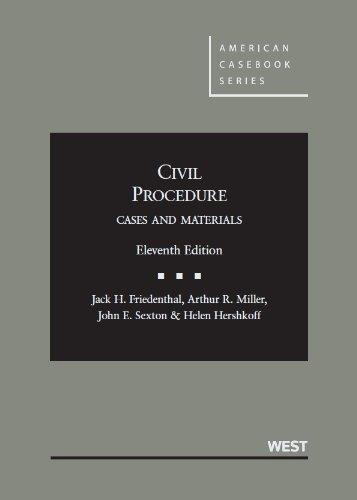1. The Sixth Circuit reversed the District Courts judgment, stating in part: In response to requests from...
Question:
1. The Sixth Circuit reversed the District Court’s judgment, stating in part:
In response to requests from their out-of-state customers, the Defendants supplied them with passwords to access online banking. The Defendants granted these passwords only after processing the customers’ applications, which included their Kentucky addresses and new service contracts specific to online banking. After processing these applications, the Defendants chose to grant passwords and online access to these Kentucky customers, allowing them to continue to conduct business with the Defendants.
We need not answer whether the issuance of a handful of passwords constitutes purposeful availment so as to satisfy due process, as the Plaintiff is unable to meet the second requirement of personal jurisdiction that the cause of action arises from the Defendants’ activities in the forum state. Even if a defendant purposefully avails himself to the benefits of doing business in a forum, the exercise of specific jurisdiction only complies with due process if “the cause of action … ha[s] a substantial connection with the defendant’s in-state activities.” * * * The defendant’s contacts with the forum state must relate to the operative facts and nature of the controversy. * * *
The Plaintiff fails to meet this burden: there is no substantial connection between three or four Kentucky residents accessing their online banking and the underlying trademark infringement claim. Even assuming that the grant of passwords for online banking constitutes in-state activity, the Defendants’ only activity in Kentucky is permitting a handful of Kentucky residents to access their online banking website. This activity is, at best, tangentially related to the allegation that the Defendants’ use of the Plaintiff’s trademark is confusing and may lead Kentucky residents to the inaccurate conclusion that the two banks are affiliated. It is hard to fathom that when these three or four Kentucky customers log-on to the Defendants’ online banking website a website they specifically requested access to that they will experience confusion arising from the Defendants’ use of the “COMMUNITY TRUST” logo. It is not enough164that there be some connection between the in-state activity and the cause of action that connection must be substantial. The Plaintiff fails to meet this standard. Consequently, personal jurisdiction over the Defendants is improper and we need not address * * * [whether] the substantial connection makes jurisdiction over the Defendant reasonable.
COMMUNITY TRUST BANCORP, INC. v. COMMUNITY TRUST FINANCIAL CORP., 692 F.3d 469, 472–73 (6th Cir. 2012). Do you agree that the small number of customers made it unreasonable for defendant to have anticipated defending a lawsuit in Kentucky? Didn’t defendant engage in an intentional act with residents of the state, and by providing a password contemplate a long-term relationship with the state’s resident? Is the Sixth Circuit’s decision consistent with McGee, p. 104, supra? Is it consistent with Justice Breyer’s concurrence in McIntyre, p. 133, supra?
Step by Step Answer:

Civil Procedure Cases And Materials
ISBN: 9780314280169
11th Edition
Authors: Jack Friedenthal, Arthur Miller, John Sexton, Helen Hershkoff






